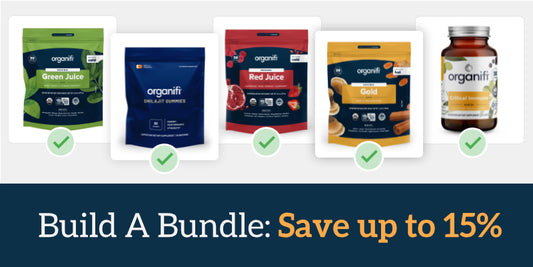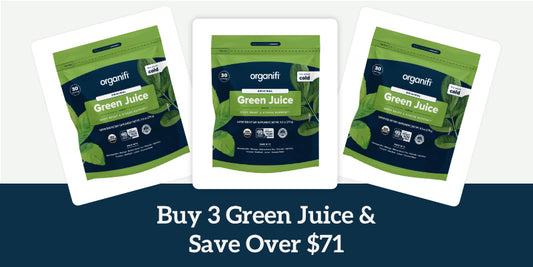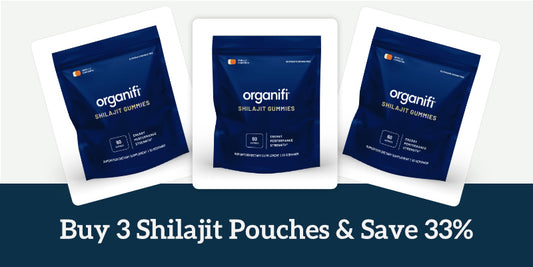Why Plant Based Protein Powder Is Better For You
Protein powder supplements are quickly becoming a staple in homes around America. Getting your daily protein needs and other nutrients in an easy-to-make form is not only convenient, but can also bring peace of mind. Am I getting enough protein? Am I eating a good breakfast? Am I getting the macro-nutrients I need to build muscle and lose fat?
Consuming a protein shake every day can help you feel confident that you are giving your body much needed macros and maybe some micros too.
But with all the protein supplements on the market, how do you know which one is best?
There are two main types of protein powder supplements on the market: plant-based protein and whey-based protein. In this article we will be discussing why you should choose plant-based protein.

What Is Plant Protein?
Plant protein is simply any protein that comes from a plant source instead of an animal source. There is a wide variety of plant-based proteins, some of which are complete proteins while others are considered incomplete. There are many benefits to getting a high percentage of your daily protein intake from plants.
What makes a protein source complete or incomplete?
Proteins are made up of amino acids. There are around 20 amino acids used by the body to build proteins, 9 of which are called 'essential.' This means your body cannot make them on its own and they must be obtained from diet.
When a food item contains all 9 of these essential aminos, it is considered a complete protein. If it only has some of them, it is considered incomplete.
Top Plant Protein Sources
Let's take a look at some of the top sources of plant based proteins. Listed next to each plant name is the amount of protein it contains per 100 grams.
Chia Seeds (16.54 g) - For such tiny little seeds, chia seeds pack quite the nutritional punch. Along with protein, they contain a powerful omega-3 fatty acid called alpha-linolenic acid, which helps tell the body to burn fats instead of storing them.
Lentils (25 g) - Lentils are low in calories and high in protein and are easy to add to a variety of dishes. Studies have found that lentils may lower cholesterol and reduce risk of heart disease. If you don't like the taste, whip them up into a hummus or burger patty recipe to hide the flavor.
Almonds (21 g) - Nuts are a fantastic source of plant protein. Almonds contain many other micro nutrients as well, such as 61% of the daily recommended intake of magnesium.
Quinoa (13 g) - Quinoa is a favorite among vegetarians and the gluten-free crowd and contains almost twice as much fiber as other grains. Forbes named quinoa "The Supergrain Of The Future" because it is extremely nutrient dense and a complete protein source.
Spirulina (57 g) - Spirulina is a rich source of vitamins, minerals and protein. In fact, this green sea vegetable contains 2800% more beta-carotene than carrots, 3900% more iron than spinach, 600% more protein than tofu and 280% more antioxidants than blueberries. Can't stand the thought of eating something green from the ocean? Drink Organifi Green Juice. You won't even know it's in there.
Pumpkin Seeds (19 g) - These little seeds are often thrown away during the Halloween season because people don't realize how incredible they are! Pumpkin seeds are packed with heart healthy magnesium, libido-enhancing zinc, plant-based omega-3 fatty acids, sleep enhancing tryptophan and inflammation/pain reducing nutrients.
Oats (16.9 g) - Oats contain a surprising amount of protein and are also an excellent source of minerals and fiber. They are also a gluten-free grain option and contain antioxidants linked to lower blood pressure.
Flax Seeds (18.29 g) - High in fiber, but low in carbs, flax seeds are a rich source of protein and heart-healthy omega-3 fatty acids. Just one tablespoon of flax seeds contains 6,338 milligrams of ALA omega-3's. Some studies suggest these little seeds may also help improve obesity and support weight loss.
Millet (11 g) - Millet is a less popular grain, but brags some impressive nutritional properties. Millet contains high levels of vitamin B as well as calcium, iron, potassium, zinc and magnesium. It also contains dietary fiber, which can help improve digestive health.
Peas (5 g) - Pea protein contains many amino acids (protein building blocs) that help with decreasing muscle breakdown after workouts. Pea protein is also becoming more popular in plant protein powders because it matches dairy-based proteins in its ability to help you feel full for a longer period of time.
Edamame (11g ) - An easy snack that contains a good amount of protein. Always try to eat organic edamame as most soybeans in the U.S. are genetically modified and treated with chemical-heavy pesticides and herbicides.
Which Plant Foods Provide Complete Protein?
While many plant-based protein sources do not contain all the essential amino acids, by eating a healthy variety of plant proteins, you can ensure that you get all the specific amino acids that you need. However, the following are the best plant-based COMPLETE protein sources:
- Quinoa
- Buckwheat
- Ezekiel Bread
- Seitan
- Rice and Beans (combined are a complete protein)
Why Should I Use Plant Based Proteins?
Diets high in plant protein are linked to many benefits. While research doesn't support a diet where one ONLY gets protein from plants, it does suggest that consuming a higher ratio of plant versus animal protein provides the following benefits.
Lower Risk Of Heart Disease
A study found that getting at least half of your daily protein from plants may help to lower blood pressure, cholesterol levels and the risk of heart disease. More so than a standard or high-carb diet. Another study found that 82% of patients with heart disease improved their symptoms after following a more plant based lifestyle.
Improve Obesity
In 2006 after reviewing data from 87 published studies, researchers found that a vegan or vegetarian diet is highly effective for weight loss. It seems that after consuming a vegan meal, one burns more calories, whereas after consuming an animal protein based meal, more of the food is stored as fat. Studies have also found that those who consume more plant-based proteins versus animal-based proteins are slimmer and have lower rates of obesity.
Lower Risk Of Diabetes
Studies have found that vegetarians have half the risk of developing diabetes as non-vegetarians and that non-vegetarians may be 74% more likely to develop diabetes over a 17-year period than vegetarians.
Reduce High Blood Pressure
When reviewing the effects of dietary choices on blood pressure in adults, the Dietary Guidelines Advisory Committee found that vegetarian based diets were associated with lower systolic blood pressure.
Improve Mortality Rates
Plant-based diets have been associated with a reduced risk for cardiovascular disease and mortality when compared with animal and meat based diets.
When Should I Use Plant Based Proteins?
The official DRI (Dietary Reference Intake) for protein is 0.36 grams of protein per pound of body weight. That averages to be about:
- 56 grams per day for men, sedentary
- 46 grams per day for women, sedentary
If you are active, an athlete or have particular health issues, then your recommended intake may vary. Consult with your healthcare professional to decide what amount of protein is best for your unique situation.
When To Drink Plant Protein
For convenience, a lot of health-conscious people are choosing to get some of their daily protein from a plant-based protein powder shake like Organifi Complete Protein. This helps bring peace of mind that you are getting the protein you need while also reducing daily hassle in the kitchen.
When to drink your plant protein smoothie/shake depends on your goals. For weight loss, some choose to substitute their protein shake in place of breakfast or lunch. Increasing protein has been found to help reduce appetite and support weight loss by helping one feel fuller longer.
For those who are athletic, drinking a protein shake post workout is an effective way to metabolize the protein needed for muscle recovery.
For people simply looking to supplement some extra protein in their diet, the time of day they drink it may not matter. Although it is better to drink it separate from meals so that the excessive liquid doesn't interfere with digestion.
Plant Protein Rich Recipes
3 Protein Packed Vegetarian Dinners
Lemon Blackberry Protein Popsicles
How To Make A Plant Protein Smoothie
Step 1: Liquid (almond milk, coconut milk, help milk, coconut water, water)
Step 2: Plant Protein (Organifi Complete Protein, pumpkin seeds, flax seeds, almonds, cashews, oats)
Step 3: Vitamins And Minerals (fruit, berries, leafy greens, avocado, cucumber, sprouts)
Step 4: Healthy Fat (coconut oil, raw nuts and seeds, avocado, chia seeds, eggs)
Sample Template
Ingredients:
- 1 cup liquid
- 1/2 cup berries/fruit
- 1/2 cup leafy greens
- 1 tbsp sweetener (raw honey, maple syrup)
- ½ cup raw or sprouted nuts and seeds OR 1-2 tbsp nut butter
- 1-2 servings of plant-based protein
Instructions: Blend all ingredients together until smooth. Drink immediately.
Chocolate Superfood Shake Recipe
Ingredients:
- 2 cups coconut milk
- 1 frozen banana
- 2 tbsp nut butter
- 1 tbsp pumpkin seeds
- 1 tbsp chia seeds
- 1 tbsp coconut oil
- 1 huge handful spinach
Instructions: Blend all ingredients together until smooth. Drink immediately.
FAQs
Q. Can I get enough protein from plants?
A. Research has found that those following a plant-based diet are not at risk for protein deficiency. There are plenty of plant-based sources of protein, including complete protein sources like quinoa.
Q. Why is plant protein better than whey?
A. Plant-based proteins, when combined correctly, can be just as effective as whey protein supplements in helping one build muscle, gain strength and recover from exercise. They also cause less "side effects" in the body such as flatulence and bloating. Whey protein supplements are heavily processed, which degrades the protein quality, increases risk for heavy metals ending up in the powders and often coincides with the use of artificial sweeteners. Plant-based proteins on the other hand are easily digestible, usually contain little or no artificial sweeteners and in general seem to be less processed.
Q. Which enzyme(s) can digest plant protein?
A. Lipase, amylase, elastases, trypsin, chumotrysin, nucleases and protease.
Q. Which plant protein is the best?
A. This depends on your goals and your tastes. All the plant proteins listed in this article carry various health benefits. Quinoa is an excellent, tasty and easy-to-make complete plant protein that can be added to a variety of recipes. Pumpkin seeds are fun to add to smoothies and shakes. Nuts are a great between-meal snack to satisfy appetite and provide fatty acids.
Q. How much plant protein do I need?
A. The official DRI (Dietary Reference Intake) for protein is 0.36 grams of protein per pound of body weight. That averages to be about: 56 grams per day for sedentary men and 46 grams per day for sedentary women. If you are active, an athlete or have particular health issues, then your recommended intake may vary. Consult with your healthcare professional to decide what amount of protein is best for your unique situation.
Conclusion
All protein originally comes from plants. Where do you think cows get it? From eating greens all day every day! Plant-based proteins are powerful and come with a host of studied benefits, including weight loss, reduced risk for diabetes and cardiovascular disease, lower mortality rates and more.
We're not saying you have to give up your steak dinners. But consider shifting your diet to be more plant based. Save the steak for special occasions. Worried you won't like the taste of your meals with less and/or no meat? All it takes is learning some new skills in the kitchen and eventually you won't think twice about eating a plant based, nutrient dense meal. The benefits are in your favor.
Remember, we're in this together.








